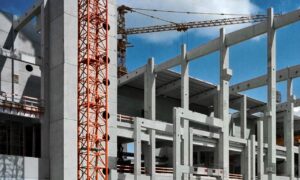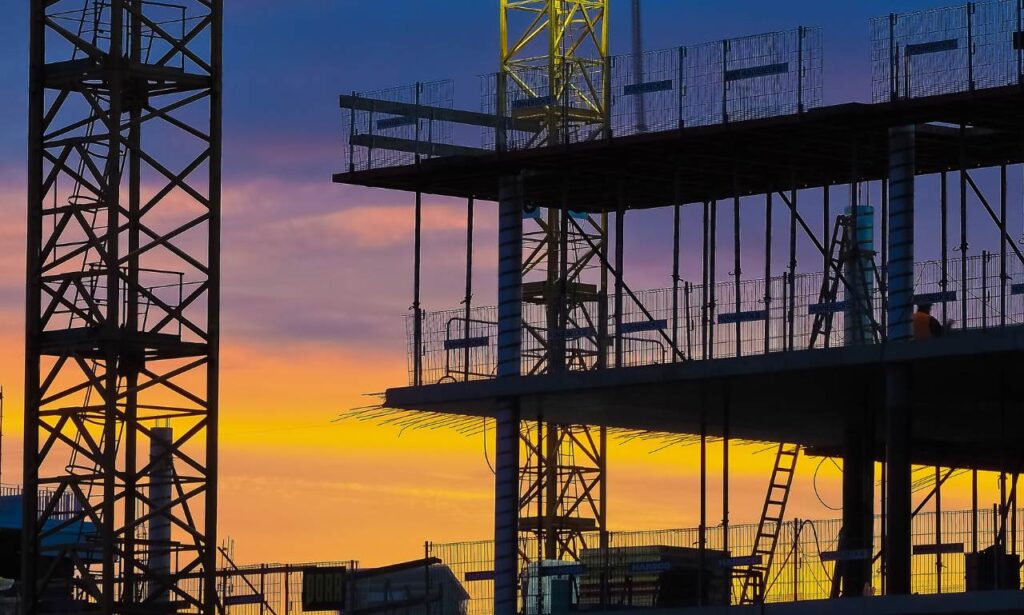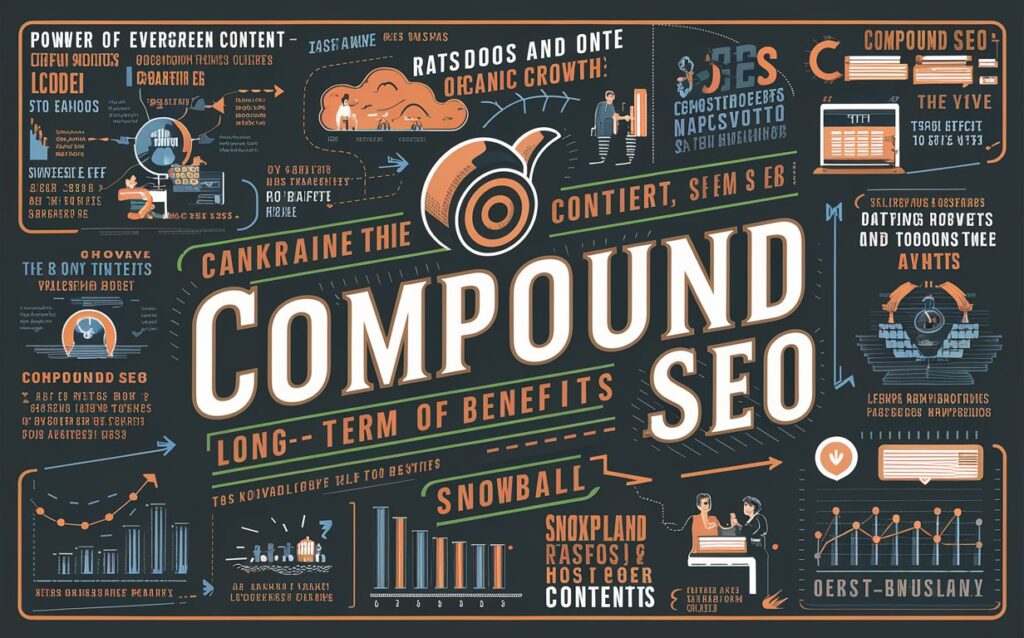Institutional lenders, including banks and credit unions, commonly make short-term construction loans. These lenders offer financing for various construction projects, such as residential and commercial developments.
Short-term construction loans are a necessity for developers who need finances to start or complete construction projects. These types of loans are designed to be paid off in a short period, usually one year or less. The loans vary in amount and interest rates depending on the lenders.
Introduction
One common institutional lender that offers short-term construction loans is a commercial bank. These loans typically range from 6 to 18 months and can finance the construction of residential or commercial properties. Commercial banks often require collateral and a sound credit history from borrowers.
For investors looking for short-term construction loans, it’s essential to know which institutional lender is reliable. Institutions that provide short-term loans typically use varying criteria to evaluate potential lenders.
The Best Institutional Lender For Short-term Construction Loans
Here are some of the most preferred institutional lenders for short-term construction loans.
Banks—Banks are the most preferred and traditional source of short-term construction loans. They offer different types of loans to suit different construction needs.
- Credit Unions—Credit unions are non-profit organizations that offer personalized services to the public. They are an excellent alternative to traditional lenders.
- Private Lenders – Private lenders are the go-to option for those who fail to qualify for bank and credit union loans. They have fewer stringent requirements due to their focus on providing short-term loans.
- Hard Money Lenders—A popular option for those facing shorter construction periods and higher interest rates, hard money lenders are well-suited for clients with unfavorable credit.
What To Consider When Choosing A Lender
Choosing the right institutional lender is essential to secure the best loan for short-term construction needs. Consider these factors:
- Lender Reputation – The ideal short-term construction lender should have a solid reputation within the industry.
- Loan Terms—Review the terms and length of the loan. Be sure to select a short-term loan that aligns with your project requirements.
- Funds Availability—Choose a lender with quick turnaround times and access to available funds so you can start your project as early as possible.
- Interest Rates and Fees—Finally, the lender should offer reasonable interest rates and fees, considering your ability to repay the loan.
Various institutional lenders offer short-term construction loans, and selecting the right one requires understanding their criteria and offerings. Know what to consider when looking for the right institutional lender to make the best choice.
Understanding Short-term Construction Loans
Short-term construction loans are commonly offered by institutional lenders such as banks, credit unions, and specialized mortgage companies. These loans are specifically designed to finance the construction of a new home or renovation of an existing property and are typically repaid in full within 12 to 18 months.
Short-term construction loans are vital for funding construction projects that are meant to last for a shorter duration, typically less than a year. These loans are ideal for real estate developers who are looking to purchase land, construct a building, and then sell or refinance the property.
Requirements For Short-term Construction Loans
If you’re applying for a short-term construction loan, there are various requirements that you should meet to be eligible. Some of these requirements include:
- A strong credit history and score: You must have a good credit score and a history that indicates you’re responsible with credit.
- Adequate income: To repay the loan, you must prove that you have sufficient income.
- Debt-to-income ratio: The lesser your debt-to-income ratio, the more eligible you are for a loan.
- Detailed project plan: A precise and detailed project plan with a cost estimate is required.
Which Institutional Lender Commonly Makes Short-term Construction Loans?
Institutions such as banks, credit unions, and private lenders provide short-term construction loans, but the most common lender for such loans is a hard money lender.
Hard money lenders are privately owned institutions that provide loans for short-term projects such as construction, renovations, and house flipping. Unlike traditional lenders, who analyze your credit score or income, hard money lenders look at your collateral, such as the property or the construction project.
Additionally, hard money lenders tend to have fewer bureaucratic hurdles than traditional lenders, making the process quick and efficient.
Advantages Of Short-term Construction Loans
Short-term construction loans offer several benefits that make them ideal for developers and contractors. Some of these benefits include:
- High approval rates: Hard money lenders have high approval rates compared to traditional lenders.
- Fast processing: The approval process for short-term construction loans takes significantly less time.
- Accessible to those with poor credit: You can secure a short-term construction loan even if your credit score is below average.
- Higher loan amounts: Hard money lenders provide higher loan amounts, allowing developers to cover most of their expenses.
A short-term construction loan is an excellent option for developers and contractors who need funds to carry out their projects. Hard money lenders are the most common institutional lenders, and they offer several advantages, such as high approval rates, fast processing, accessibility, and higher loan amounts.
However, before getting a short-term construction loan, it’s essential to ensure that you meet the eligibility requirements and have a comprehensive project plan.
The Role Of Institutional Lenders In Construction Financing

One institutional lender commonly making short-term construction loans is commercial banks. These lenders offer financing to support the construction process until a long-term mortgage can be secured, providing developers with the necessary funds for their projects.
One common solution to financing a construction project is securing a short-term construction loan from institutional lenders. Institutional lenders play a significant role in providing construction financing and offer several benefits to borrowers.
Benefits Of Institutional Lenders For Construction Financing
Institutional lenders provide a few benefits when it comes to financing your construction project, including:
- Lower Interest Rates: Institutional lenders, such as banks or insurance companies, offer lower interest rates than non-institutional lenders.
- Flexible Loan Terms: Institutional lenders usually offer more flexible loan terms, giving the borrower more control over the loan’s repayment process.
- Credibility: Dealing with institutional lenders means your lender is reputable and trustworthy, which instills confidence in your project and enhances its credibility.
- Higher Loan Amount: Institutional lenders may allow for higher loan amounts, allowing you to finance more extensive construction projects.
Types Of Institutional Lenders For Short-term Construction Financing
Several types of institutional lenders commonly provide short-term construction financing, such as:
- Banks: National banks offer traditional construction loans backed by the Small Business Administration (SBA), which usually last between six months and two years.
- Insurance Companies: Insurance companies are commercial lenders that finance construction projects, providing larger loans of up to $20 million.
- Credit Unions: Credit unions are similar to banks but emphasize lending to members rather than making profits. They provide competitive loan rates and flexible repayment plans.
- Private equity funds invest in construction projects and provide financing through loans or equity stake investments.
When securing a short-term construction loan, institutional lenders provide an array of benefits that non-institutional lenders cannot offer. Consider the different types of institutional lenders available and the financing options they can provide to determine which solution will best fit your financial needs.
Tips For Choosing The Right Institutional Lender
Short-term construction loans are commonly offered by institutional lenders such as banks and credit unions. When choosing the right lender, it is important to consider the loan terms, interest rates, and the lender’s reputation in the industry.
Constructing a building from scratch can be exciting and daunting, especially when it comes to financing. A short-term construction loan is a viable option for those looking to cover the costs of building a new property. But who offers this type of loan, and how do you choose the right one?
We’ll focus on tips for selecting the best institutional lender that commonly makes short-term construction loans.
Look For A Lender With Experience
Construction loans are complex, and the lender you choose should have a proven track record of successfully providing these loans. An experienced lender can guide you through the entire process, from applications to disbursement of funds.
Consider Their Loan Terms
Different lenders have different repayment terms. You want to choose the one that suits your needs. For instance, some lenders charge interest-only payments during the construction period, while others require full payments. Find out which type of payment plan works best for you.
Check The Interest Rates
Every loan has interest rates, so it’s essential to do your research to ensure that you select a lender with competitive rates. Shop around, compare the rates offered, and opt for the one that best fits your budget.
Evaluate Their Loan Requirements
Each lender has its own lending requirements, including financials, credit score, and down payment. You must make sure that you meet the lender’s minimum requirements before applying for a loan.
Pre-qualification Process
Some lenders will pre-qualify you for a loan before you start the application process. This ensures that you save your time applying for a loan you may not qualify for. Look for a lender who offers pre-qualification; it will save you time and energy in the long run.
Look For A Flexible Lender
Your dream home or building may require changes along the way, and you want to work with a lender that can accommodate those adjustments. It’s essential to find a lender who is flexible enough to work with you in case of changes.
Check Their Reputation
You want to work with a lender with a good reputation. Check out their online reviews and ratings to ascertain their reputation. Additionally, ask your architect or contractor for referrals.
Check For Hidden Fees
Some lenders will add hidden fees, such as loan processing fees, origination fees, and appraisal fees. Make sure you find out all potential fees before applying for a loan.
Customer Service
Customer service is essential, and you want to work with a lender that puts their client’s needs first. Choose a lender with excellent customer service and one that values communication throughout the process.
Licensing
Make sure that the lender is licensed to offer loans in your state. Lenders must have a valid license to legally offer loans in your state.
Choosing the right institutional lender for your short-term construction loan is essential. Follow these tips, and you’ll have a smooth loan process and turn your vision into reality.
The Loan Application Process
Short-term construction loans are commonly offered by institutional lenders such as banks and credit unions. These loans typically have a shorter repayment period and are used for funding small construction projects, renovations, repairs, or upgrades.
Short-term construction loans can be instrumental in funding real estate development projects. If you’re looking to secure one, you should know which institutional lender commonly makes such loans. In this section, we’ll explore the loan application process adopted by such a lender.
Start By Gathering Required Documents
Before starting the loan application process, you will need to collect the necessary paperwork. Ensure the following documents are in order:
- Financial statements of the borrower and guarantor(s).
- Property appraisal report.
- Construction plan, schedule, and budget.
- Projected cash flow statements.
- Building permit and other necessary permissions.
Submitting The Loan Application
Once you’ve gathered all the necessary documents, the next step is to submit your loan application. Typically, the lender will provide you with a comprehensive application form. Be sure to answer all questions as accurately as possible and attach all the required documents to the form.
Lender’s Review Process
Once the lender receives your loan application, their underwriting team will begin the review process. They will scrutinize your application and supporting documents to determine the level of risk involved in your project. They will assess factors such as your credit history, financial capacity, project budget, and timelines, among others.
If your application passes the initial review stage, the lender may request additional information from you.
Property Appraisal
As part of the loan application process, the lender will typically hire an appraiser to evaluate your property’s value. They will examine comparable properties, review local real estate market trends, and develop an estimated value for your property based on their findings.
Loan Commitment
If your loan application meets the lender’s underwriting criteria, they will issue a loan commitment letter. This letter will outline the loan’s terms and conditions, including the interest rate, collateral requirements, repayment schedule, and any other fees involved.
Closing Of The Loan
Upon accepting the loan commitment letter, the lender will schedule a closing date for the loan. At this stage, you will sign the loan agreement and provide the necessary collateral. Then, the lender will finalize the loan disbursement.
Understanding the loan application process for short-term construction loans can be instrumental in securing funding for your project. Follow the framework laid out here to improve your chances of securing the loan you need to complete your construction project.
Loan Disbursement And Management
Short-term construction loans are commonly offered by institutional lenders such as banks and credit unions. These loans are specifically designed for construction projects and are typically disbursed in stages as the project progresses to ensure proper fund management.
Many institutional lenders offer short-term construction loans, but not all lenders provide the same loan disbursement and management services. Keep reading to find out which lender commonly offers short-term construction loans.
When it comes to short-term construction loans, it’s essential to work with a lender who can provide efficient and effective loan disbursement and management. Here are the common loan disbursement and management practices used by institutional lenders:
- Construction Draws: This process involves the lender making payments to contractors and other stakeholders according to the construction timeline. Lenders use a milestone-based system to remit funds for completed work, ensuring progress and that the borrower isn’t overextending themselves financially.
- Inspections: Inspections are an essential part of the loan disbursement process. Lenders inspect the construction site at regular intervals to ensure that the work is being done correctly and that the funds are being used for their intended purposes.
- Budgeting: Proper budgeting is critical for short-term construction loans. An institutional lender must have a system in place to ensure the borrower only takes on what they can handle.
- Flexibility: Institutional lenders should be flexible when working with borrowers to ensure that the construction project runs smoothly. Suppose a borrower encounters unexpected challenges during the construction process that increases the project’s cost or timeline. In that case, the institutional lender should be willing to discuss and find a solution that works for both parties.
Short-term construction loans have unique loan disbursement and management practices that institutional lenders commonly follow. To ensure a smooth and efficient borrowing process, it’s essential to work with a lender with experience in this area.
Conclusion
Short-term construction loans can help developers to finance their construction projects. Institutional lenders such as banks and credit unions commonly offer these loans and have specific requirements that borrowers must meet to be eligible. It is important to do research and work with a reputable lender to ensure a smooth borrowing experience.
With careful planning and execution, short-term construction loans can be a valuable tool for completing successful construction projects.
Frequently Asked Questions
What Is An Institutional Lender In Real Estate?
An institutional lender in real estate refers to a lending organization that provides loans backed by real estate as collateral. These lenders may include banks, credit unions, insurance companies, and pension funds. They are generally more reliable and have a significant amount of capital to offer borrowers.
Which Financial Institution Primarily Makes Short-Term Loans To Businesses To Finance Their Operations?
A financial institution that primarily provides short-term loans to businesses to finance their operations is known as a working capital lender.
Which Of The Following Is An Institutional Lender?
An institutional lender is a financial organization that provides loans and other financial services to large companies, government bodies, and other established institutions. Examples of institutional lenders include commercial banks, investment banks, and insurance companies.
What Is A Construction Loan Quizlet?
A construction loan on Quizlet is a short-term loan used to fund the construction of a new building or structure. It is typically paid out in stages as the project progresses and is often converted into a long-term mortgage once the construction is complete.
How Can I Get A Short-term Construction Loan?
You can get a short-term construction loan from institutional lenders. They require good credit and collateral.
What Is A Short-term Construction Loan?
A short-term construction loan is a loan specifically designed to fund construction projects. It usually lasts 12 to 18 months.












